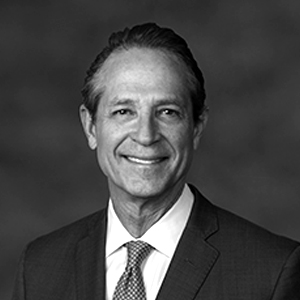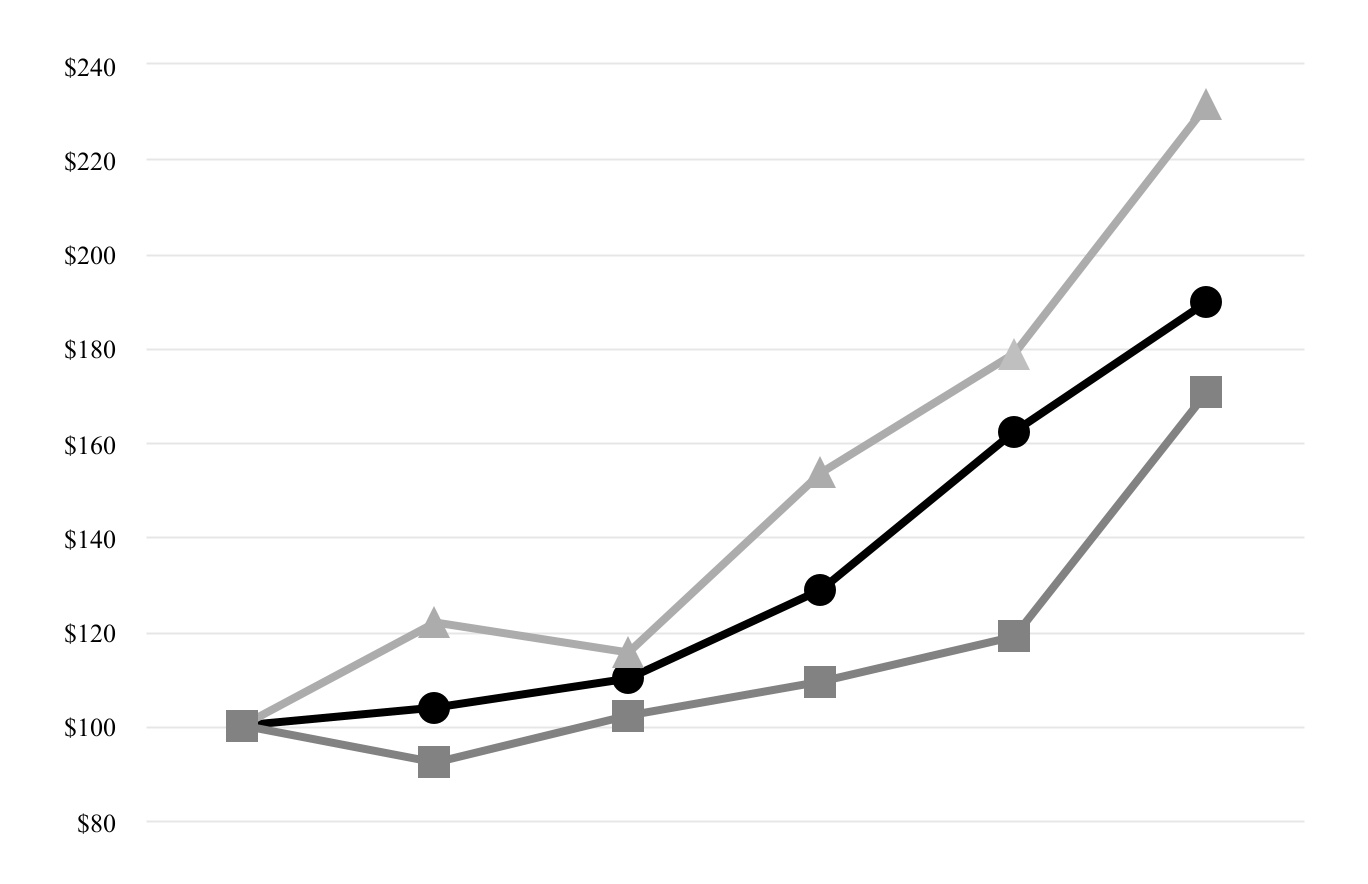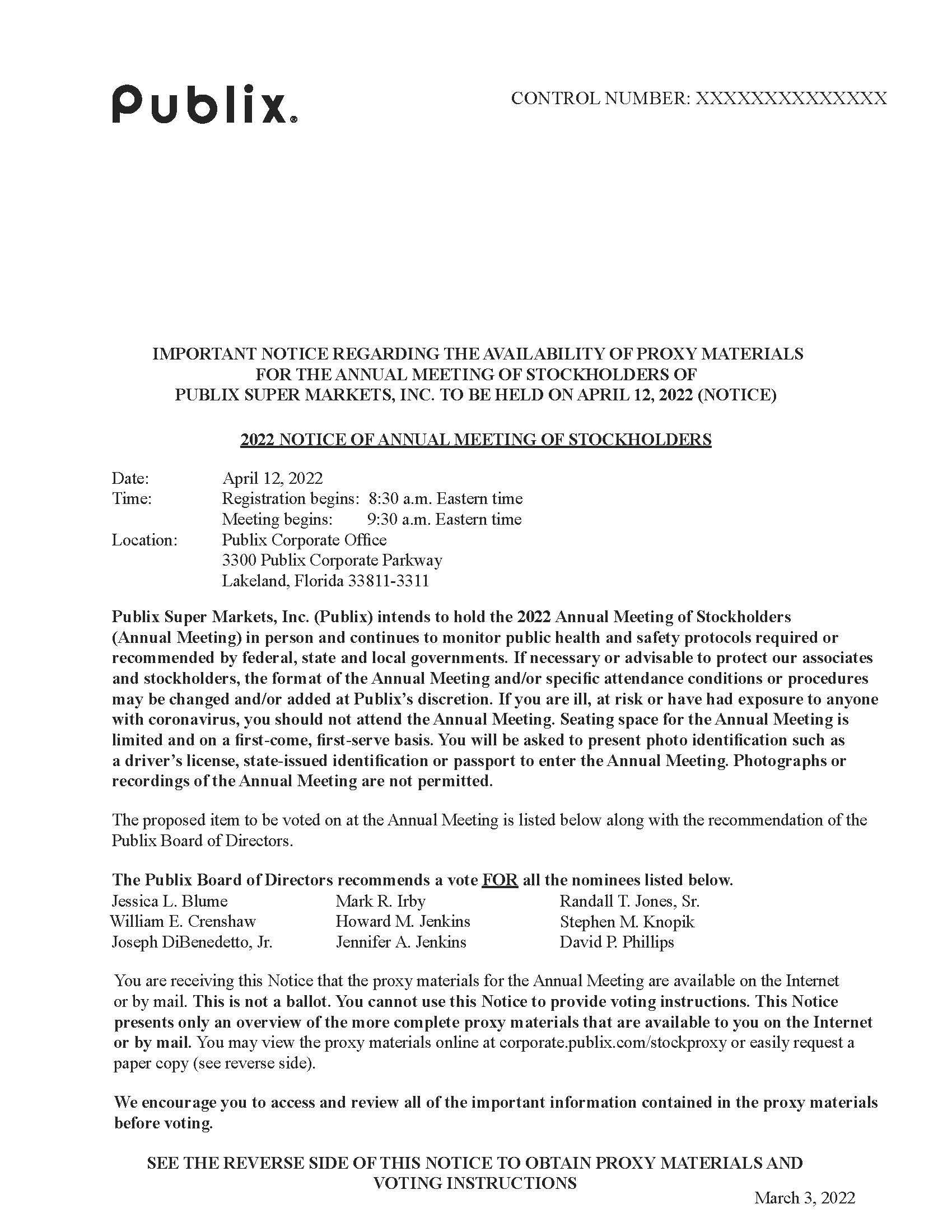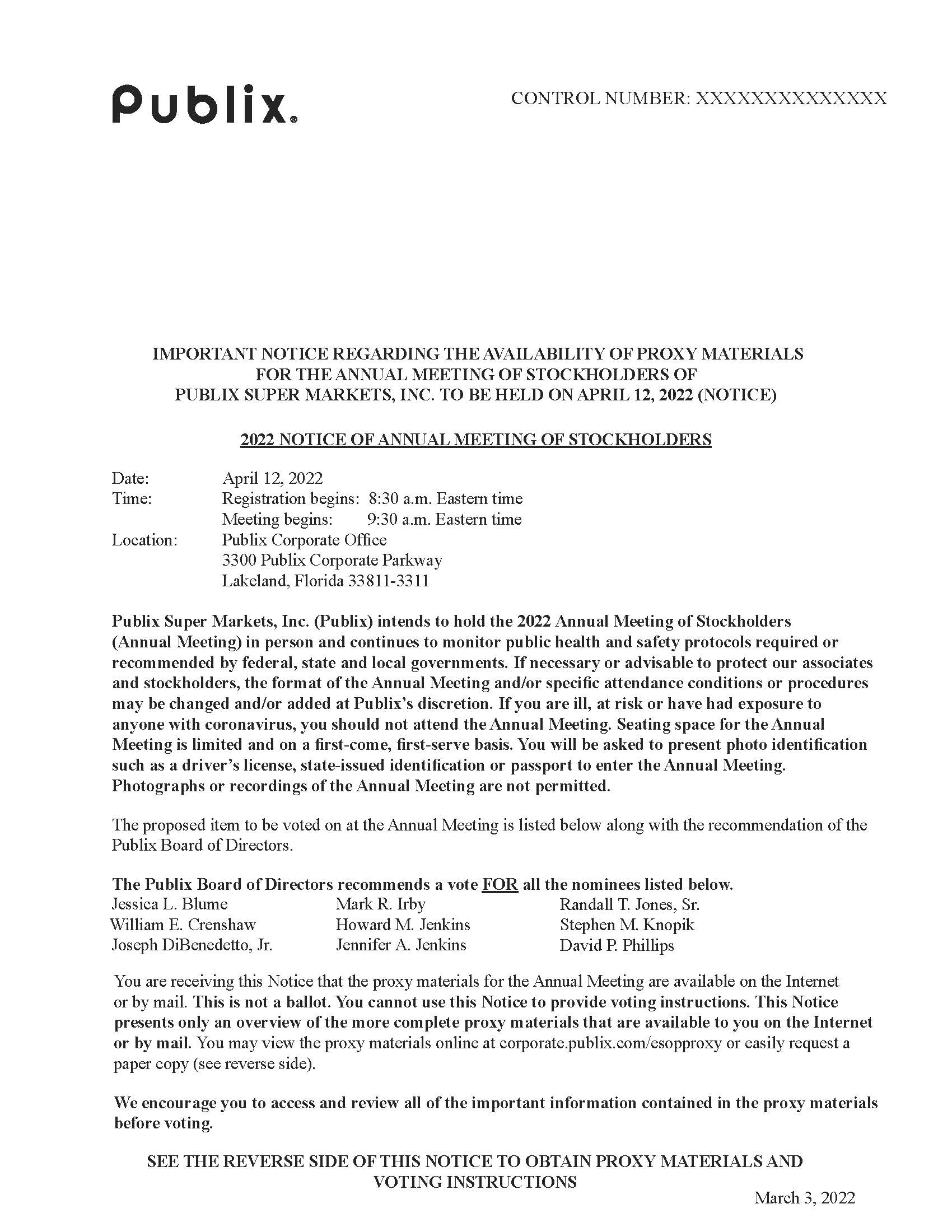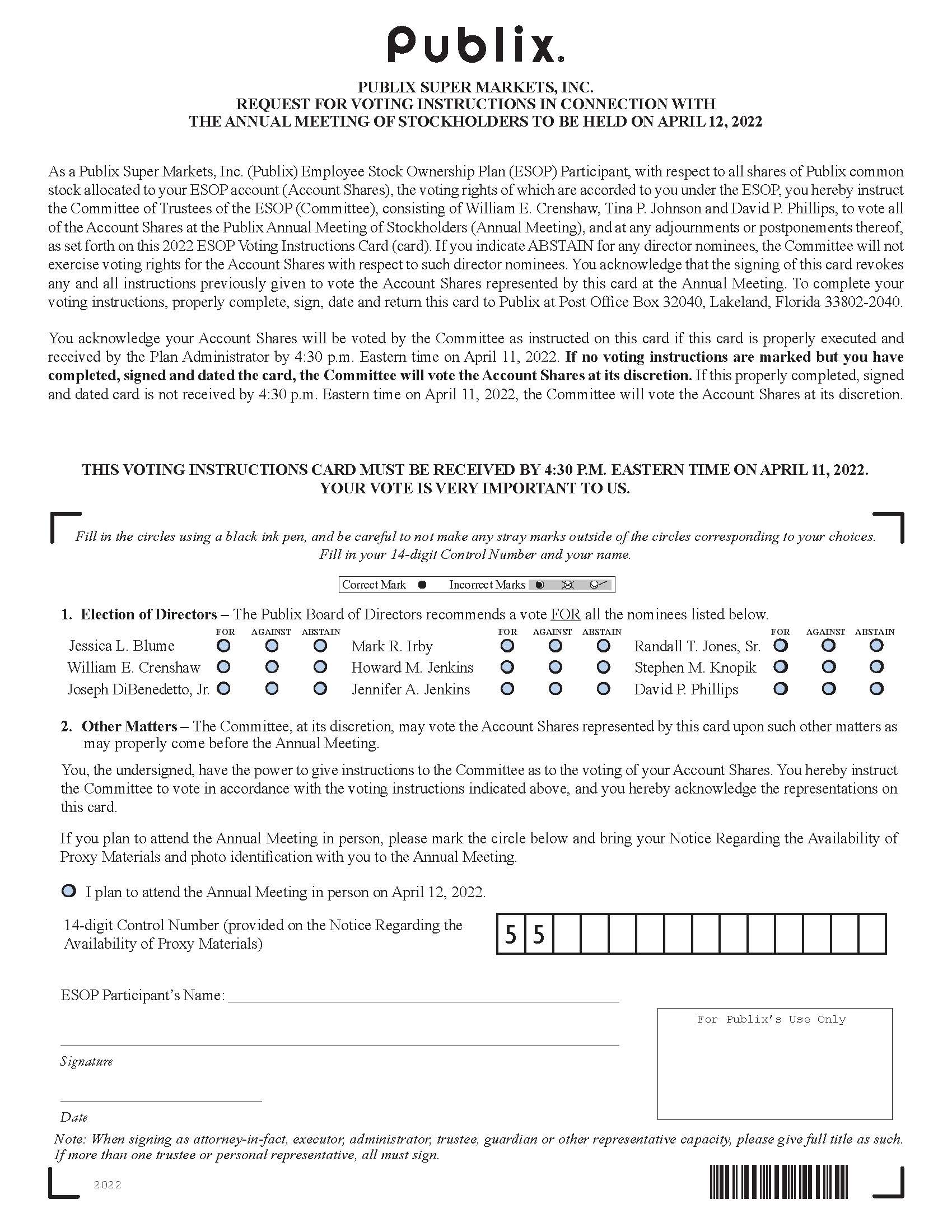UNITED STATES
SECURITIES AND EXCHANGE COMMISSION
Washington, D.C. 20549
SCHEDULE 14A
Proxy Statement Pursuant to Section 14(a) of the
Securities Exchange Act of 1934
(Amendment No. )
Filed by the Registrant x
Filed by a Party other than the Registrant o
Check the appropriate box:
| | | | | |
| o | Preliminary Proxy Statement |
| o | Confidential, for Use of the Commission Only (as permitted by Rule 14a-6(e)(2)) |
| x | Definitive Proxy Statement |
| o | Definitive Additional Materials |
| o | Soliciting Material Pursuant to §240.14a-12 |
PUBLIX SUPER MARKETS, INC.
(Name of Registrant as Specified In Its Charter)
(Name of Person(s) Filing Proxy Statement, if other than the Registrant)
Payment of Filing Fee (Check the appropriate box):
| | | | | | | | | | | | | | | | | |
| x | | No fee required. |
| | |
| o | | Fee computed on table below per Exchange Act Rules 14a-6(i)(1) and 0-11. |
| | |
| (1) | Title of each class of securities to which the transaction applies: |
| | |
| (2) | Aggregate number of securities to which the transaction applies: |
| | |
| | |
| (3) | Per unit price or other underlying value of the transaction computed pursuant to Exchange Act Rule 0-11 (set forth the amount on which the filing fee is calculated and state how it was determined): |
| | |
| (4) | Proposed maximum aggregate value of the transaction: |
| | |
| (5) | Total fee paid: |
| | |
| o | | Fee paid previously with preliminary materials. |
| | |
| | | | | | | | | | | | | | | | | |
| o | Check box if any part of the fee is offset as provided by Exchange Act Rule 0-11(a)(2) and identify the filing for which the offsetting fee was paid previously. Identify the previous filing by registration statement number, or the Form or Schedule and the date of its filing. |
| | |
| (1) | Amount Previously Paid: |
| | |
| (2) | Form, Schedule or Registration Statement No.: |
| | |
| (3) | Filing Party: |
| | |
| (4) | Date Filed: |
| | |
PUBLIX SUPER MARKETS, INC.
| | | | | | | | |
| Corporate Office | | Proxy Card Address |
| 3300 Publix Corporate Parkway | | P.O. Box 32040 |
Lakeland, Florida 33811-3311 | | Lakeland, Florida 33802-2040 |
2022 NOTICE OF ANNUAL MEETING OF STOCKHOLDERS TO BE HELD ON APRIL 12, 2022
To Our Stockholders:
Notice is hereby given that the Annual Meeting of Stockholders of Publix Super Markets, Inc., a Florida corporation, will be held at the corporate office of the Company, 3300 Publix Corporate Parkway, Lakeland, Florida, on Tuesday, April 12, 2022, at 9:30 a.m. Eastern time for the following purposes:
1.To elect the nominees in the accompanying Proxy Statement to the Board of Directors; and
2.To transact such other business as may properly come before the Annual Meeting or any adjournments or postponements thereof.
Your vote is important. Please consider the information presented in the accompanying Proxy Statement and vote your shares as promptly as possible.
By order of the Board of Directors,
Merriann M. Metz
Secretary
Lakeland, Florida
March 1, 2022
| | |
CORONAVIRUS PRECAUTIONS FOR THE ANNUAL MEETING
|
The Company intends to hold the Annual Meeting in person and continues to monitor public health and safety protocols required or recommended by federal, state and local governments. If necessary or advisable to protect our associates and stockholders, the format of the Annual Meeting and/or specific attendance conditions or procedures may be changed and/or added at the Company’s discretion. If you are ill, at risk or have had exposure to anyone with coronavirus, you should not attend the Annual Meeting. Seating space for the Annual Meeting is limited and on a first-come, first-serve basis. You will be asked to present photo identification such as a driver’s license, state-issued identification or passport to enter the Annual Meeting. Photographs or recordings of the Annual Meeting are not permitted. |
2022 PROXY STATEMENT
GENERAL INFORMATION
On March 3, 2022, notices regarding the availability of online proxy materials (Notices) or proxy materials were mailed to the stockholders of Publix Super Markets, Inc. (Company or Publix) and Notices were mailed or distributed to participants of the Publix Employee Stock Ownership Plan (ESOP). The Notices are in connection with the solicitation of proxies by the Board of Directors (Board or Board of Directors) of the Company and in connection with the request for voting instructions by the Committee of Trustees of the ESOP (ESOP Committee) for use at the Annual Meeting of Stockholders (Annual Meeting) to be held on April 12, 2022 or any adjournments or postponements thereof. The Notices provide stockholders and ESOP participants with instructions on how to access the proxy materials online or request a paper or email copy, the proposal to be voted on at the Annual Meeting and instructions on how to vote. The cost of providing voting instructions and soliciting proxies is borne by the Company. The Company’s Board of Directors and employees also may solicit proxies by email, mail, facsimile, telephone and personal contact. They do not receive any additional compensation for these activities.
VOTING SECURITIES OUTSTANDING
As of February 1, 2022, there were 682,254,000 shares of common stock of the Company outstanding and entitled to vote at the Annual Meeting. Each share is entitled to one vote on each matter. Only stockholders of record as of the close of business on February 1, 2022 will be entitled to vote at the Annual Meeting. ESOP participants are not entitled to vote at the Annual Meeting with respect to shares of common stock allocated to their ESOP accounts, but may provide voting instructions for those shares to the ESOP Committee. Voting instructions must be received by the ESOP Committee by 4:30 p.m. Eastern time on April 11, 2022.
VOTING PROCEDURES FOR STOCKHOLDERS
Stockholders have the right to revoke submitted proxy cards at any time before they are exercised by filing a written notice of revocation or submitting a duly executed proxy card bearing a later date with the Secretary of the Company at the corporate office of the Company or by mailing it to the Company at the proxy card address. The execution of a proxy card will not prevent a stockholder from voting in person at the Annual Meeting.
The proxy cards and any ballots voted at the Annual Meeting will be tabulated by employees of the Company. The shares of a stockholder attending in person or by proxy will be counted as part of the quorum for the Annual Meeting, even if that stockholder abstains or otherwise does not vote on any matter. A majority of the outstanding shares of the Company entitled to vote, represented in person or by proxy, shall constitute a quorum. The affirmative vote of a plurality of the votes cast is required for the election of directors. Any other matter submitted to a vote of the stockholders will be approved if the votes cast in favor of the matter are greater than the votes cast in opposition to the matter. A properly executed proxy card marked “ABSTAIN” for the election of a particular nominee or nominees for director will not be voted for the director nominee or nominees indicated but will be counted for purposes of determining whether there is a quorum.
VOTING INSTRUCTIONS FOR ESOP PARTICIPANTS
ESOP participants have the right to instruct the ESOP Committee, consisting of William E. Crenshaw, Tina P. Johnson and David P. Phillips, as to how to vote the shares of common stock allocated to their ESOP accounts at the Annual Meeting. The ESOP Committee will vote the ESOP shares at its discretion only if no instructions are received from ESOP participants. ESOP participants have the right to revoke submitted voting instructions cards by filing a written notice of revocation or submitting a duly executed voting instructions card bearing a later date with the ESOP Committee at the corporate office of the Company or by mailing it to the ESOP Committee at the proxy card address. Voting instructions cards and written notices of revocation must be received by the ESOP Committee by 4:30 p.m. Eastern time on April 11, 2022.
PROPOSAL: ELECTION OF DIRECTORS
The Company’s Bylaws specify that the Board of Directors shall not be less than three or more than 15 members. The exact number of directors shall be fixed by resolution adopted by a vote of a majority of the then authorized number of directors. The Board of Directors has fixed the number of directors at nine members to be effective as of the election of the directors at the Annual Meeting. The nominees for election as a director are Jessica L. Blume, William E. Crenshaw, Joseph DiBenedetto, Jr., Mark R. Irby, Howard M. Jenkins, Jennifer A. Jenkins, Randall T. Jones, Sr., Stephen M. Knopik and David P. Phillips. All nominees except Mark R. Irby are
currently directors of the Company. The proxies will be voted FOR the election of the nine nominees unless the stockholder specifies otherwise.
The term of office of the directors will be until the next Annual Meeting or until their successors shall be elected and qualified. If one or more of the nominees become unable or unwilling to serve at the time of the Annual Meeting, the shares represented by proxy will be voted for the remaining nominees and for any substitute nominee(s) designated by the Board of Directors or, if none, the size of the Board will be reduced accordingly. The Board of Directors does not anticipate that any nominee will be unable or unwilling to serve.
The Board of Directors recommends a vote FOR all the nominees.
INFORMATION ABOUT NOMINEES FOR DIRECTOR
The following information set forth for each of the nominees for election to the Board of Directors includes such person’s principal occupation presently and during the last five years; specific experience, qualifications, attributes or skills that qualify such person to serve as a director; service as a director of public companies during the last five years; all positions and offices held with the Company; period of service as director of the Company and age.
| | | | | |
| Jessica L. Blume Vice Chair of Deloitte LLP from 2012 until retiring in August 2015. Previously, Managing Director of Research and Innovation from 2009 to 2012, National Managing Director - Consulting from 2006 to 2009, Southeast Regional Managing Director - Consulting from 2003 to 2006 and Atlanta Managing Director - Consulting from 2001 to 2003. Serves on the Audit Committee as an Audit Committee financial expert. Qualifications include extensive experience in business and accounting, serving on the Deloitte LLP governing board for six years and on various committees and qualifying to serve as an Audit Committee financial expert. Currently serves as a Director of Centene Corporation. Director since 2016. Age 67. |
| | | | | |
| William E. Crenshaw Chairman of the Board of the Company and Trustee of the ESOP Committee since May 2019. Previously, Chairman of the Board from May 2016 to May 2019 and Chief Executive Officer from 2008 to May 2016. Qualifications include extensive business experience serving as an Officer of the Company for 26 years and on the Board of the Company for 31 years. Director since 1990. Age 71. |
| | | | | |
| Joseph DiBenedetto, Jr. Vice President of the Atlanta Division of the Company from 2011 until retiring in December 2019. Previously, Regional Director of Retail Operations from 1995 to 2011. Qualifications include extensive business experience serving as an Officer of the Company for nine years and on the Board of the Company for two years. Director since 2020. Age 62. |
| | | | | |
| Mark R. Irby Vice President of Marketing of the Company from 1989 until retiring in February 2022. Qualifications include extensive business experience serving as an Officer of the Company for 33 years. Recommended by a management director as a nominee for director of the Company. Age 66. |
| | | | | |
| |
| Howard M. Jenkins Chairman of the Board of the Company to 2008. Qualifications include extensive business experience serving as an Officer of the Company for 24 years and on the Board of the Company for 44 years. Currently serves as a Director of Hyliion Holdings Corporation. Director since 1977. Age 70. |
| Jennifer A. Jenkins Clinical Professor of Law and Director of the Center for the Study of the Public Domain at Duke University Law School since 2002. Previously, legal associate at Kilpatrick Townsend & Stockton LLP from 2000 to 2002. Received J.D. from Duke University Law School in 1997. Qualifications include extensive education and experience in law. Director since 2019. Age 49. |
| Randall T. Jones, Sr. Chief Executive Officer of the Company since January 2019. Previously, Chief Executive Officer and President from May 2016 to January 2019 and President from 2008 to May 2016. Qualifications include extensive business experience serving as an Officer of the Company for 18 years and on the Board of the Company for six years. Director since 2016. Age 59. |
| Stephen M. Knopik Executive Chairman of the Board of Beall’s, Inc. from December 2019 until retiring in July 2020. Previously, Chairman of the Board and Chief Executive Officer from December 2016 to December 2019, Chief Executive Officer from 2006 to December 2016, President, Chief Financial Officer and Director of Finance from 1984 to 2006 and various positions with KPMG LLP from 1978 to 1984. Serves on the Audit Committee as an Audit Committee financial expert. Qualifications include extensive experience in business and accounting, including serving as Chief Executive Officer and Chief Financial Officer of a retail company, and qualifying to serve as an Audit Committee financial expert. Director since 2013. Age 66. |
| David P. Phillips Executive Vice President, Chief Financial Officer and Treasurer of the Company and Trustee of the ESOP Committee since May 2016. Previously, Chief Financial Officer, Treasurer and Trustee of the ESOP Committee from July 2015 to May 2016 and Chief Financial Officer and Treasurer from 1999 to July 2015. Qualifications include extensive business and accounting experience serving as an Officer of the Company for 31 years and on the Board of the Company for six years. Director since 2016. Age 62. |
William E. Crenshaw is the nephew of Howard M. Jenkins. Jennifer A. Jenkins is the second cousin of William E. Crenshaw and the first cousin once removed of Howard M. Jenkins.
CORPORATE GOVERNANCE
BOARD LEADERSHIP STRUCTURE AND ROLE IN RISK OVERSIGHT
The Company does not have a formal policy regarding the separation of the Chairman of the Board and Chief Executive Officer positions. The Company determines the leadership structure it deems appropriate based on factors such as the experience of the applicable individuals, the current business environment of the Company or other relevant factors. The Company’s current Chairman of the Board retired as Chief Executive Officer in April 2016 after serving 25 years on the Company’s Board of Directors, including eight years as Chief Executive Officer. Based on the former Chief Executive Officer’s extensive experience, the Company determined that separating the positions of Chairman of the Board and Chief Executive Officer is the appropriate board leadership structure at this time.
The Board of Directors is responsible for oversight of the Company’s risk management practices while management is responsible for the day-to-day risk management processes. This division of responsibilities is the most effective approach for addressing the risks facing the Company, and the Company’s board leadership structure supports this approach. The Board receives periodic reports from management regarding the most significant risks facing the Company. The Audit Committee assists the Board in its oversight role by receiving periodic reports regarding the Company’s risk and control environment. In addition, the Compensation Committee assists the Board in its oversight of compensation related risks.
BOARD MEETINGS
The Board of Directors held four meetings during 2021. All directors attended all meetings of the Company’s Board of Directors. The Company does not have a specific policy regarding director attendance at the Annual Meeting. Due to the coronavirus pandemic, only William E. Crenshaw and Randall T. Jones, Sr. attended the last Annual Meeting on April 13, 2021 (2021 Annual Meeting). During 2021, the Board of Directors consisted of Jessica L. Blume, William E. Crenshaw, Chairman, Joseph DiBenedetto, Jr., Howard M. Jenkins, Jennifer A. Jenkins, Randall T. Jones, Sr., Stephen M. Knopik and David P. Phillips.
DIRECTOR INDEPENDENCE
The Board of Directors has determined that directors Jessica L. Blume, Jennifer A. Jenkins and Stephen M. Knopik are independent as defined by the rules of the New York Stock Exchange. The Company is not a listed issuer on an established securities market but has chosen the definition of director independence contained in the rules of the New York Stock Exchange as the Company’s standard for determining director independence. The Company does not have a majority of independent directors.
In determining independence, the Board of Directors reviews whether directors have any material relationship with the Company, considering all relevant facts and circumstances. In assessing the materiality of a director’s relationship with the Company, the Board of Directors considers the facts and circumstances from the director’s standpoint and from the perspective of the persons or organizations with which the director has an affiliation. The Board reviews commercial, industrial, consulting, legal, accounting, charitable and family relationships. An independent director must not have any material relationship with the Company, either directly or indirectly, that would interfere with the exercise of independent judgment in carrying out the responsibilities of a director.
In applying its independence standards for each director identified as independent, the Board of Directors determined that Jessica L. Blume, Jennifer A. Jenkins and Stephen M. Knopik have no material relationships with the Company other than as a director.
COMMITTEES
The Board of Directors had the following committees during 2021, each of which is described below: Executive, Audit, Compensation, Corporate Governance and Nominating.
The Executive Committee’s primary responsibility is to act on behalf of the Board of Directors between meetings of the Board. During 2021, the Executive Committee held seven meetings and consisted of William E. Crenshaw, Chairman, Howard M. Jenkins, Randall T. Jones, Sr. and David P. Phillips. All committee members attended all meetings of the Executive Committee.
The Audit Committee has responsibility for assessing the processes related to the Company’s risk and control environment, overseeing financial reporting and overseeing the internal and independent audit processes. The Audit Committee operates under a written charter which is posted on the Company’s website at corporate.publix.com/governance. The Audit Committee reviews and reassesses the charter annually and recommends any changes to the Board of Directors for approval. During 2021, the Audit Committee held four meetings and consisted of Jessica L. Blume, Chairwoman, Jennifer A. Jenkins and Stephen M. Knopik. All of the committee members are independent as defined by Rule 10A-3 of the Exchange Act and the rules of the New York Stock Exchange. The Board of Directors has also determined that Jessica L. Blume and Stephen M. Knopik are audit committee financial experts as defined by the rules of the Securities and Exchange Commission (SEC). All committee members attended all meetings of the Audit Committee.
The Compensation Committee has responsibility for reviewing and setting the salary and benefits structure of the Company with respect to the named executive officers. The Committee also has responsibility to (1) assist the Board of Directors in evaluating the compensation of the Chief Executive Officer and other named executive officers and (2) assure that the Chief Executive Officer and other named executive officers are compensated effectively in a manner consistent with the compensation philosophy of the Company. The Compensation Committee operates under a written charter which is posted on the Company’s website at corporate.publix.com/governance. During 2021, the Compensation Committee held four meetings and consisted of Jessica L. Blume, Joseph DiBenedetto, Jr. and Stephen M. Knopik, Chairman. A majority of the committee members are independent as defined by the rules of the New York Stock Exchange. All committee members attended all meetings of the Compensation Committee except one member who missed one meeting.
The Corporate Governance Committee has responsibility for reviewing and reporting to the Board of Directors on matters of corporate governance such as practices, policies and procedures affecting directors and the Board’s operations and effectiveness. The Corporate Governance Committee is also responsible for recommending the amount and form of compensation for non-employee directors independent of management. The Corporate Governance Committee operates under a written charter. During 2021, the Corporate Governance Committee held four meetings and consisted of Jennifer A. Jenkins, Stephen M. Knopik, Chairman, and David P. Phillips. A majority of the committee members are independent as defined by the rules of the New York Stock Exchange. All committee members attended all meetings of the Corporate Governance Committee.
The Nominating Committee has responsibility for reviewing and reporting to the Board of Directors on matters of Board nominations. This includes reviewing potential candidates and proposing nominees to the Board of Directors. The Nominating Committee operates under a written charter which is posted on the Company’s website at corporate.publix.com/governance. During 2021, the Nominating Committee held one meeting and consisted of William E. Crenshaw, Howard M. Jenkins, Chairman, and Randall T. Jones, Sr. A majority of the committee members are not independent as defined by the rules of the New York Stock Exchange. In the opinion of the Board of Directors, each committee member has the ability to make objective decisions independent of management. All committee members attended the meeting of the Nominating Committee.
The Company does not have a formal policy regarding the consideration of any director candidates recommended by stockholders. However, the Nominating Committee considers recommendations for director candidates from several sources, including stockholders. Candidates must meet minimum qualifications for directors as set forth in the Company’s Corporate Governance Guidelines. The candidates also must have any additional qualifications identified by the Nominating Committee as may be currently required to maintain the appropriate balance of knowledge, experience and expertise on the Board of Directors. Candidate recommendations, together with appropriate biographical information, should be sent to the Chairman of the Nominating Committee, c/o Secretary, Publix Super Markets, Inc., P.O. Box 407, Lakeland, Florida 33802-0407.
The Nominating Committee does not have a formal policy regarding the consideration of diversity for director candidates. In evaluating candidates for the Board of Directors, the Nominating Committee seeks to maintain a balance of diverse business experience, education, skills and other individual qualities and attributes in order to maximize the effectiveness of the Board of Directors. The Nominating Committee also considers the specific skills necessary for candidates to effectively participate on certain Board committees. The candidates should possess the highest personal and professional ethics, integrity and values and be committed to representing the long-term interests of the stockholders. In addition, selection criteria may include, but not necessarily be limited to, the following:
•no conflict of interest
•willingness to devote adequate time and effort to Board responsibilities
•ability to work with current Board of Directors
•ability to assess corporate strategy
•willingness to provide management oversight
•broad business experience, judgment and leadership
•significant years of management experience in a senior policy-making position
•knowledge of the supermarket business or other retail business and
•knowledge of business trends including, but not limited to, relevant regulatory affairs.
COMMUNICATION WITH DIRECTORS
Any stockholder or other party interested in communicating with the Board of Directors, either as a group or with an individual member of the Board of Directors, may do so by writing c/o Secretary, Publix Super Markets, Inc., P.O. Box 407, Lakeland, Florida 33802-0407. All communications to the Board of Directors or a specified individual director will be provided to the Board of Directors or the specified individual director at the next Board meeting following receipt of the communication. However, if the Secretary determines the nature of the communication requires the immediate attention of the Board of Directors or the specified individual director, the communication will be provided as soon as reasonably possible.
BENEFICIAL OWNERSHIP OF SECURITIES
The following table presents information about the shares of the Company’s common stock deemed to be beneficially owned, under Rule 13d-3 of the Exchange Act as a result of voting and/or investment power, as of the close of business on February 1, 2022 by each of the Company’s directors and the director nominee, each named executive officer and all directors and executive officers as a group. Additionally, the table presents the persons known by the Company to be a beneficial owner of more than 5% of the Company’s outstanding common stock.
| | | | | | | | | | | | | | |
| Name of beneficial owner | Number of shares of common stock beneficially owned as of February 1, 2022 (1) | % of class |
| Jessica L. Blume | 7,000 | | (2) | * |
| William E. Crenshaw | 3,613,011 | | (3)(15) | * |
| Joseph DiBenedetto, Jr. | 346,680 | | (4) | * |
| Mark R. Irby | 115,286 | | (5) | * |
| Howard M. Jenkins | 624,774 | | (6) | * |
| Jennifer A. Jenkins | 1,473,769 | | (7) | * |
| Randall T. Jones, Sr. | 78,862 | | (8) | * |
| Stephen M. Knopik | 26,000 | | (9) | * |
| David P. Phillips | 372,701 | | (10)(15) | * |
| Kevin S. Murphy | 41,613 | | (11) | * |
| Laurie Z. Douglas | 87,197 | | (12) | * |
| David E. Bornmann | 158,467 | | (13) | * |
| Tina P. Johnson | 40,142,558 | | (14)(15)(16) | 5.88 | | |
| Employee Stock Ownership Plan | 161,527,883 | | (15) | 23.68 | | |
| 401(k) Plan | 65,532,310 | | (16) | 9.61 | | |
| All directors and executive officers as a group | 6,935,863 | | (17) | 1.02 | | |
* Shares represent less than 1% of common stock.
(1)“Beneficial ownership” means the sole or shared voting or investment power with respect to the Company’s common stock. In accordance with the beneficial ownership regulations, the same shares of common stock may be presented as beneficially owned by more than one individual or entity. The address for all beneficial owners is 3300 Publix Corporate Parkway, Lakeland, Florida 33811-3311 with a mailing address of P.O. Box 407, Lakeland, Florida 33802-0407.
(2)Ms. Blume has shared voting and investment power over 7,000 shares of common stock which are held directly.
(3)Mr. Crenshaw has sole voting and investment power over 2,947,065 shares of common stock which are held directly, sole voting and investment power over 498,024 shares of common stock which are held indirectly and shared voting and investment power over 167,922 shares of common stock which are held indirectly.
(4)Mr. DiBenedetto, Jr. has sole voting and investment power over 21,163 shares of common stock which are held indirectly, shared voting and investment power over 319,869 shares of common stock which are held directly and shared voting and investment power over 5,648 shares of common stock which are held indirectly.
(5)Mr. Irby has sole voting and shared investment power over 101,643 shares of common stock which are held indirectly, shared voting and investment power over 13,605 shares of common stock which are held directly and no voting and shared investment power over 38 shares of common stock which are held indirectly.
(6)Mr. H. Jenkins has sole voting and investment power over 620,486 shares of common stock which are held directly and shared voting and investment power over 4,288 shares of common stock which are held indirectly. Total shares beneficially owned by Mr. H. Jenkins exclude 6,821,781 shares of common stock for which Mr. H. Jenkins disclaims beneficial ownership.
(7)Ms. J. Jenkins has sole voting and investment power over 1,300,000 shares of common stock which are held directly and shared voting and investment power over 3,086 shares of common stock which are held indirectly. Total shares beneficially owned include 170,683 shares of common stock which are held indirectly for which Ms. J. Jenkins has no voting or investment power.
(8)Mr. Jones, Sr. has sole voting and investment power over 8,841 shares of common stock which are held directly, sole voting and investment power over 6,915 shares of common stock which are held indirectly, sole voting and shared investment power over 57,430 shares of common stock which are held indirectly, shared voting and investment power over 3,490 shares of common stock which are held directly and no voting and shared investment power over 2,186 shares of common stock which are held indirectly.
(9)Mr. Knopik has sole voting and investment power over 26,000 shares of common stock which are held directly.
(10)Mr. Phillips has sole voting and investment power over 24,025 shares of common stock which are held indirectly, sole voting and shared investment power over 68,983 shares of common stock which are held indirectly, shared voting and investment power over 162,878 shares of common stock which are held directly, shared voting and investment power over 114,629 shares of common stock which are held indirectly and no voting and shared investment power over 2,186 shares of common stock which are held indirectly.
(11)Mr. Murphy has sole voting and investment power over 16,673 shares of common stock which are held directly, sole voting and shared investment power over 23,783 shares of common stock which are held indirectly and no voting and shared investment power over 1,157 shares of common stock which are held indirectly.
(12)Ms. Douglas has sole voting and shared investment power over 10,418 shares of common stock which are held indirectly, shared voting and investment power over 68,974 shares of common stock which are held directly, shared voting and investment power over 7,377 shares of common stock which are held indirectly and no voting and shared investment power over 428 shares of common stock which are held indirectly.
(13)Mr. Bornmann has sole voting and investment power over 1,281 shares of common stock which are held directly, sole voting and investment power over 1,600 shares of common stock which are held indirectly, sole voting and shared investment power over 54,783 shares of common stock which are held indirectly, shared voting and investment power over 79,805 shares of common stock which are held directly, shared voting and investment power over 18,812 shares of common stock which are held indirectly and no voting and shared investment power over 2,186 shares of common stock which are held indirectly.
(14)Ms. Johnson has sole voting and investment power over 104,398 shares of common stock which are held directly, sole voting and investment power over 4,455 shares of common stock which are held indirectly, sole voting and shared investment power over 62,324 shares of common stock which are held indirectly and shared voting and investment power over 135,397 shares of common stock which are held indirectly. Ms. Johnson also has sole voting and investment power over 10,541,341 shares of common stock as the trustee of trusts and shared voting and investment power over 29,294,643 shares of common stock as the co-trustee of a trust for which Ms. Johnson does not have a pecuniary interest. To avoid confusion, the total shares presented in the table as beneficially owned by Ms. Johnson exclude 65,530,124 shares of common stock held by the Company’s 401(k) Plan that may be deemed to be beneficially owned by Ms. Johnson in her capacity as Trustee of the Company’s common stock held in the 401(k) Plan. As a Trustee, Ms. Johnson exercises sole voting power over 65,532,310 shares of common stock held by the 401(k) Plan.
(15)Mr. Crenshaw, Mr. Phillips and Ms. Johnson are Trustees of the ESOP Committee. The ESOP is the record owner of 161,527,883 shares of common stock. For ESOP shares allocated to participants’ accounts, the ESOP Committee will vote the shares as instructed by participants. The ESOP Committee will vote the shares at its discretion only if no instructions are received from ESOP participants.
(16)Ms. Johnson is Trustee of the Company’s common stock held in the 401(k) Plan which is the record owner of 65,532,310 shares of common stock. She has sole voting and shared investment power over these shares, except to the extent of her individual holdings in the 401(k) Plan for which she has sole voting and investment power.
(17)As a group, the directors and executive officers have sole voting and investment power over 4,920,472 shares of common stock which are held directly, sole voting and investment power over 551,732 shares of common stock which are held indirectly, sole voting and shared investment power over 284,940 shares of common stock which are held indirectly, shared voting and investment power over 666,312 shares of common stock which are held directly, shared voting and investment power over 321,762 shares of common stock which are held indirectly, no voting and shared investment power over 19,962 shares of common stock which are held indirectly and no voting and no investment power over 170,683 shares of common stock which are held indirectly. The total shares beneficially owned by the directors and executive officers as a group includes the shares of common stock held in the directors’ and executive officers’ individual ESOP and 401(k) Plan accounts.
DELINQUENT SECTION 16(a) REPORTS
Under Section 16 of the Exchange Act, certain directors, executive officers and stockholders of the Company are required to file reports of stock ownership and changes therein with the SEC. The Company believes that its directors, executive officers and stockholders complied with the Section 16 filing requirements.
COMPENSATION COMMITTEE INTERLOCKS AND INSIDER PARTICIPATION
There were no interlocks of directors or executive officers of the Company serving on the compensation or equivalent committee or board of directors of another entity which has any director or executive officer serving on the Compensation Committee or Board of Directors of the Company.
CERTAIN RELATIONSHIPS AND RELATED TRANSACTIONS
The Board of Directors has adopted a written Related Party Transactions Policy that delegates to the Corporate Governance Committee the authority to approve or disapprove the entry into Related Party Transactions. The Corporate Governance Committee is responsible for reviewing the material facts of all Related Party Transactions and either approving or disapproving the entry into a Related Party Transaction. In determining whether to approve or disapprove a Related Party Transaction, the Corporate Governance Committee considers, among other factors it deems appropriate, whether the Related Party Transaction is on terms no less favorable than terms generally available to an unaffiliated third party under the same or similar circumstances as well as the extent of the Related Party’s interest in the transaction. No director participates in any discussion or approval of a Related Party Transaction for which he or she is a Related Party. The Company defines a Related Party Transaction in its Related Party Transactions Policy as follows:
A “Related Party Transaction” is any transaction, arrangement or relationship or series of similar transactions, arrangements or relationships (including any indebtedness or guarantee of indebtedness) in which (1) the aggregate amount involved will or may be expected to exceed $120,000 in any calendar year, (2) the Company is a participant, and (3) any Related Party (as defined below) has or will have a direct or indirect interest (other than solely as a result of being a director or a less than 10% beneficial owner of another entity).
A “Related Party” is any (1) person who is or was (since the beginning of the last fiscal year for which the Company has filed a Form 10-K and proxy statement, even if they do not presently serve in that role) an Officer, Director or Nominee for election as a Director, (2) greater than 5% beneficial owner of the Company’s common stock, or (3) immediate family member of any of the foregoing. Immediate family member includes a person’s spouse, parents, stepparents, children, stepchildren, siblings, mothers- and fathers-in-law, sons- and daughters-in-law, and brothers- and sisters-in-law and anyone residing in such person’s home (other than a tenant or employee).
There were no Related Party Transactions during 2021.
EXECUTIVE COMPENSATION
COMPENSATION DISCUSSION AND ANALYSIS
The Compensation Discussion and Analysis includes the following: (1) an overview of the Compensation Committee of the Board of Directors, (2) the compensation philosophy of the Company and (3) the components of executive compensation.
Overview of the Compensation Committee
The Compensation Committee’s primary responsibilities include evaluating the Company’s philosophy regarding executive compensation and evaluating and determining the compensation of the Chief Executive Officer and other named executive officers. The Compensation Committee has the authority under its charter to engage the services of outside advisors, experts and others to assist it. During 2021, the Compensation Committee did not engage any such advisors. A majority of the committee members are independent as defined by the rules of the New York Stock Exchange.
The Chief Executive Officer and certain other members of management are invited to attend all or a portion of a Compensation Committee meeting depending on the nature of the agenda items, but the members of management do not vote on items before the Compensation Committee. However, the Compensation Committee solicits the views of the Chief Executive Officer on compensation matters, including the compensation of the other named executive officers. The Compensation Committee works with members of management to determine the agenda for each meeting, and management prepares the applicable meeting materials.
Compensation Philosophy
The Company includes in its employee handbook the following compensation philosophy for all employees (referred to as “associates” below):
As a food retailer in a highly competitive market, Publix recognizes that our associates are our primary asset and contribute to our competitive advantage. To achieve our mission, Publix must continue to attract, retain, motivate and reward highly qualified associates. To fulfill this responsibility we strive to:
•offer pay and benefits that contribute to our associates’ financial security now and at retirement
•offer wages that are competitive within our local markets
•provide benefits that meet the diverse needs of our associates
•reward associates for premier performance
•provide opportunity for future rewards as a result of promotion from within
•educate our associates on pay and benefits and
•ensure equal opportunity in all aspects of pay and benefits.
The Company’s compensation objective for the named executive officers is the same as for all employees indicated above: to attract, retain, motivate and reward highly qualified individuals.
In addition, the Compensation Committee considers additional factors when determining the compensation of the named executive officers. These factors include (1) the overall level of responsibility and the relationship to compensation levels of the Company’s management, (2) the compensation levels of executive officers of companies in the Company’s Peer Group (as defined in the Performance Graph), taking into account the size and financial performance of the companies, (3) anticipated competitive operating conditions and (4) overall economic conditions.
The Compensation Committee uses publicly available compensation data to review the compensation levels of named executive officers of companies in the Company’s Peer Group. The review includes base pay, bonus pay and other pay components. The Compensation Committee also compares the financial results of these companies to the Company’s results. Although the Company’s financial results have generally been superior to the companies in its Peer Group, the total compensation of the Company’s named executive officers is significantly less than the total compensation of the named executive officers of companies in its Peer Group. Therefore, the Compensation Committee believes the compensation for the named executive officers reflects its position that compensation should be set at responsible levels for all employees, including the named executive officers, and be consistent with the Company’s constant focus on controlling costs in its low margin business.
In connection with the 2020 Annual Meeting, the Company’s stockholders and ESOP participants were given an opportunity to approve, by an advisory (non-binding) vote, the compensation of the Company’s named executive officers. More than 99% of the advisory votes cast approved the compensation of the Company’s named executive officers. The Compensation Committee considered the results of the advisory vote in determining compensation policies and decisions of the Company. The advisory vote affected the Company’s executive compensation policies and decisions by reaffirming the Company’s compensation philosophy. Additionally, at the 2017 Annual Meeting, the Company’s stockholders and ESOP participants approved holding the advisory vote on executive compensation every three years. The advisory (non-binding) vote on the frequency of holding future advisory votes must be held every six years.
The next opportunity for the Company’s stockholders and ESOP participants to cast advisory (non-binding) votes on the compensation of the Company’s named executive officers and the frequency of future advisory votes on the compensation of the named executive officers will be in connection with the 2023 Annual Meeting.
Components of Executive Compensation
The Company’s executive compensation includes the following components: base salary, incentive bonus plan, retirement benefits and other benefits. With the exception of the incentive bonus plan, which has approximately 400 participants, and the Supplemental Executive Retirement Plan (SERP), these components are available to all or large numbers of the Company’s employees. The Company does not have a specific compensation program focused solely on the named executive officers.
Base Salary
The named executive officers are paid a base salary that is typically reviewed annually. As indicated, the factors considered in determining the base salaries of the named executive officers include (1) the overall level of responsibility and the relationship to compensation levels of the Company’s management, (2) the compensation levels of executive officers of companies in the Company’s Peer Group, taking into account the size and financial performance of the companies, (3) anticipated competitive operating conditions and (4) overall economic conditions. These factors are considered in conjunction with the performance of the named executive officers and the results of the Company. There are no significant differences in the compensation policies for the individual named executive officers.
The Company analyzed the total compensation of the Company’s named executive officers compared to the total compensation of the named executive officers of companies in the Company’s Peer Group as reported in their most recent public filings as of April 1, 2021. Based on this analysis, the total compensation of the Company’s Chief Executive Officer was 78% less than the average total compensation of the chief executive officers of companies in the Company’s Peer Group. The total compensation of all of the Company’s named executive officers was 69% less than the average total compensation of the named executive officers of companies in the Company’s Peer Group. The Compensation Committee monitors the difference between the total compensation of the Company’s named executive officers and the total compensation of the named executive officers of companies in the Company’s Peer Group and uses this information as it deems appropriate.
The Compensation Committee approved base salary increases effective May 1, 2021 for the named executive officers as follows: Randall T. Jones, Sr. - 5%, Kevin S. Murphy - 7%, David P. Phillips - 5%, Laurie Z. Douglas ‑ 6% and David E. Bornmann - 5%. These increases in the base salaries for the named executive officers were made largely in consideration of factor (2) described above because the compensation of the Company’s named executive officers is generally substantially less than the compensation of the named executive officers of companies in the Company’s Peer Group. The base salaries for the named executive officers are presented in the Summary Compensation Table.
Incentive Bonus Plan
The Company provides performance-based incentive compensation in the form of an annual cash bonus (Incentive Bonus Plan) to all officers, including the named executive officers, and certain staff employees of the Company (Incentive Bonus Participants). The Incentive Bonus Plan is designed to reward the Incentive Bonus Participants based on the Company achieving its sales and target profit goals (Performance Goals) for the fiscal year and not on their individual performance. The Incentive Bonus Plan is approved by the Compensation Committee as to officers and by the Executive Committee as to other Incentive Bonus Participants. The Performance Goals are reviewed and approved by the Company’s Board of Directors after the completion of the Company’s annual planning process. Although the Company has a defined method for calculating the incentive bonus, the Board of Directors, Compensation Committee and Executive Committee retain the right to amend or discontinue the Incentive Bonus Plan at their discretion at any time, unless payment of the incentive bonus has been approved. Prior to 2020, no such discretion had been exercised.
The Incentive Bonus Plan is intended to compensate the Incentive Bonus Participants for their services during the calendar year based on the Company’s actual results compared to the Performance Goals. The incentive bonus pool is determined in the year earned and paid in the subsequent year to Incentive Bonus Participants employed with the Company at the end of the calendar year. In general, the incentive bonus pool is allocated to the Incentive Bonus Participants according to the relative base compensation paid to them during the calendar year for which the incentive bonus is being paid.
The Incentive Bonus Plan is based on a target bonus equal to two months pay (Target Bonus) for all Incentive Bonus Participants entitled to the full Target Bonus (participants generally transition into the Incentive Bonus Plan over a 12 month period). The formula for the Incentive Bonus Plan is determined so that if the Performance Goals for the fiscal year are achieved, the Incentive Bonus Participants will receive the Target Bonus. The incentive bonus can be more or less than the Target Bonus based on the Company’s actual results compared to the Performance Goals. Historically, if the sales goal is not achieved, the incentive bonus pool, calculated using the formula, is reduced by 5% for every 1% that actual sales are less than the sales goal. If the sales goal is exceeded, the incentive bonus pool is increased by 5% for every 1% that actual sales are greater than the sales goal. No incentive bonus is paid unless greater than 80% of the target profit goal is achieved. Due to the impact of the coronavirus pandemic, the Incentive Bonus Plan formula was amended for 2021 by the Compensation Committee and Executive
Committee prior to approval of the incentive bonus for payment. The formula was amended to eliminate the adjustment to the incentive bonus pool for the difference between actual sales and the sales goal. Therefore, actual sales exceeding the sales goal did not result in an increase in the incentive bonus pool.
The Incentive Bonus Participants will receive an incentive bonus in excess of the Target Bonus of two months pay for 2021 as the Company’s actual results exceeded its amended Performance Goals. Over the past five fiscal years including 2021, the Incentive Bonus Participants received an average incentive bonus of 3.5 months pay or approximately 26.9% of their base salary. Incentive Bonus Participants received the Target Bonus of two months or more in each of the past five years.
The Board of Directors attempts to set Performance Goals that maintain a consistent level of difficulty in achieving the Target Bonus from year to year and are challenging but reasonably achievable. Therefore, the achievement of future Target Bonuses is likely to be similar to past years unless unexpected circumstances, like the coronavirus pandemic, arise. Achieving the Target Bonus is dependent on the Company’s sales and profit results for the year which are affected by many factors, including competitor activities and economic conditions. The Board of Directors, Compensation Committee and Executive Committee have historically not made changes to the Performance Goals or to the Incentive Bonus Plan formula for the fiscal year after their approval. Therefore, it is likely that positive or negative changes in various factors, including competitor activities and economic conditions, will affect the likelihood and difficulty of achieving the Target Bonus for the fiscal year. The Company expects the prior results of achieving the Target Bonus in some years and not achieving it in other years to continue.
The incentive bonuses for the named executive officers are presented in the Summary Compensation Table and the Grants of Plan-Based Awards table.
Retirement Benefits
The Company has a trusteed, noncontributory ESOP for the benefit of eligible employees. The amount of the Company’s discretionary contribution to the ESOP is determined annually by the Board of Directors. The ESOP does not discriminate, in scope, terms or operation, in favor of the named executive officers. The Company’s contribution to the ESOP is allocated to all eligible participants on the basis of eligible compensation up to the maximum annual compensation limit (compensation limit) for retirement plans established by federal law. Due to the compensation limit, the named executive officers did not receive Company contributions under the ESOP for their 2021 compensation in excess of $290,000. Company contributions to the ESOP for the named executive officers are presented in the Summary Compensation Table. Non-employee directors of the Company’s Board of Directors do not participate in the ESOP.
The Company has a SERP for a select group of employees whose compensation is consistently higher than the compensation limit for retirement plans. The purpose of the SERP is to provide these employees with the benefit they would have received under the ESOP if the Company’s contributions were not limited by the compensation limit. The Company’s contribution to the SERP (referred to as SERP shares) is calculated as the difference between the contribution that the employee would have received under the ESOP if the Company’s contributions were not limited by the compensation limit and the actual contribution received under the ESOP. In addition, since dividends are paid to ESOP participants on their ESOP shares of common stock, dividend equivalents are paid on the SERP shares. The SERP allows these employees with compensation in excess of the compensation limit to receive a retirement benefit at the same percentage of their compensation as other Company employees. Company contributions to the SERP for the named executive officers are presented in the Summary Compensation Table and the Nonqualified Deferred Compensation table. Non-employee directors of the Company’s Board of Directors do not participate in the SERP.
The Company has a 401(k) Plan for the benefit of eligible employees. The 401(k) Plan is a voluntary defined contribution plan. Eligible employees may contribute up to 30% of their eligible annual compensation, subject to the maximum contribution limits established by federal law. The Company may make a discretionary annual matching contribution to eligible participants of this plan as determined by the Board of Directors. For 2021, the Board of Directors approved a match of 50% of eligible annual contributions up to 3% of eligible annual compensation, not to exceed a maximum match of $750 per employee. The 401(k) Plan does not discriminate, in scope, terms or operation, in favor of the named executive officers. Company matching contributions for the named executive officers are presented in the Summary Compensation Table. Non-employee directors of the Company’s Board of Directors do not participate in the 401(k) Plan.
Other Benefits
The Company’s group health, dental, vision and supplemental life insurance plans are available to eligible full‑time and part-time employees, and the group life insurance and long-term disability plans are available to eligible full-time employees. These plans do not discriminate, in scope, terms or operation, in favor of the named executive officers. Non-employee directors of the Company’s Board of Directors do not participate in the plans.
The Company does not provide country club memberships, personal use of Company airplanes, tax and financial planning services or other perquisites frequently offered to executive officers. The named executive officers, other than the Chief Executive Officer, receive a vehicle allowance that had a total value for 2021 of less than $10,000 per named executive officer. The Chief Executive Officer elected not to receive a vehicle allowance.
In addition, the Company does not provide the following forms of compensation or arrangements frequently offered to executive officers:
•long-term cash incentives
•stock options, stock awards or other equity incentives or
•employment contracts, change in control agreements or severance agreements.
The Company does not provide compensation that is directly tied to the performance of the Company’s common stock. However, since the Company’s retirement benefits are substantially in the form of Company common stock, there is a long-term link between compensation of the named executive officers and any gain or loss realized by the Company’s stockholders.
Tax Deductibility of Executive Compensation
Section 162(m) of the Internal Revenue Code limits the federal income tax deductibility of certain compensation paid by a company to its chief executive officer and other highly compensated executive officers to $1,000,000 per person. This limit does not apply to company ESOP and 401(k) plan contributions. The Company does not have a policy that limits the compensation of executive officers to the amount deductible for tax purposes.
Recovery of Compensation
Section 304 of the Sarbanes-Oxley Act of 2002 requires the Chief Executive Officer and Chief Financial Officer to repay to the Company certain amounts received by such officers if the Company restates its financial statements as a result of financial reporting misconduct. The amounts to be repaid consist of (1) any bonus or other incentive-based or equity-based compensation received from the Company during the 12 month period following the filing of the financial statements in question and (2) any profits realized from the sale of the Company’s common stock during that 12 month period. In addition, to the extent permitted by applicable law, the Company may seek to recover incentive compensation from others as a result of such financial reporting misconduct. In such a situation, the Board of Directors would exercise its judgment to determine what action it deems appropriate, including recovery of the incentive compensation.
Hedging Policy
The SEC requires a company to describe any adopted policies or practices regarding the ability of its directors, officers or employees to engage in transactions to hedge or offset any decrease in the market value of its equity securities. The Company does not have such a policy; however, since its common stock is not traded on an established securities market, the Company does not believe that such hedging instruments are available to its directors, officers or employees.
Compensation Compared to Peer Group Companies
The total compensation of the named executive officers in the Summary Compensation Table ranks at or near the bottom of the total compensation of comparable positions of companies in the Company’s Peer Group as defined in the Performance Graphs in the Company’s Form 10-K and this Proxy Statement.
Summary Compensation Table
The following Summary Compensation Table presents information concerning the compensation of the Company’s named executive officers for 2021, 2020 and 2019.
| | | | | | | | | | | | | | | | | | | | | | | | | | | | | | | | | | | |
Name and
Principal Positions,
( ) Years of Service | Year | Salary | Bonus | Stock Awards | Option Awards | Non-Equity Incentive Plan Compensation (1) | Change in Pension Value and Nonqualified Deferred Compensation Earnings | All Other Compensation | Total |
Randall T. Jones, Sr. (42)
Chief Executive Officer | 2021 | $2,350,105 | | — | — | — | $ 874,248 | | — | | $209,471 (2) | $3,433,824 | |
| 2020 | 2,244,610 | | — | — | — | 1,131,370 | | — | | 201,135 | | 3,577,115 | |
| 2019 | 2,158,270 | | — | — | — | 359,791 | | — | | 190,958 | | 2,709,019 | |
Kevin S. Murphy (37)
President | 2021 | 1,339,170 | | — | — | — | 498,176 | | — | | 116,863 (2) | 1,954,209 | |
| 2020 | 1,255,010 | | — | — | — | 632,573 | | — | | 99,338 | | 1,986,921 | |
| 2019 | 1,149,360 | | — | — | — | 191,602 | | — | | 44,511 | | 1,385,473 | |
David P. Phillips (37)
Executive Vice President, Chief Financial Officer and Treasurer | 2021 | 1,277,165 | | — | — | — | 475,110 | | — | | 114,362 (2) | 1,866,637 | |
| 2020 | 1,219,815 | | — | — | — | 614,834 | | — | | 109,837 | | 1,944,486 | |
| 2019 | 1,172,905 | | — | — | — | 195,527 | | — | | 104,361 | | 1,472,793 | |
Laurie Z. Douglas (16)
Senior Vice President,
Chief Information Officer and Chief Digital Officer | 2021 | 1,235,395 | | — | — | — | 459,571 | | — | | 109,077 (2) | 1,804,043 | |
| 2020 | 1,165,460 | | — | — | — | 587,437 | | — | | 102,692 | | 1,855,589 | |
| 2019 | 1,102,575 | | — | — | — | 183,803 | | — | | 93,614 | | 1,379,992 | |
David E. Bornmann (38)
Senior Vice President | 2021 | 706,125 | | — | — | — | 262,681 | | — | | 63,415 (2) | 1,032,221 | |
| 2020 | 672,500 | | — | — | — | 338,966 | | — | | 59,106 | | 1,070,572 | |
| 2019 | 635,200 | | — | — | — | 105,890 | | — | | 50,645 | | 791,735 | |
(1)Amounts in this column represent Incentive Bonus Plan payments earned in the applicable year and paid in the subsequent year.
(2)Amounts represent the Company’s contributions to the ESOP, SERP and 401(k) Plan for 2021. The amount included for the ESOP and 401(k) Plan for each named executive officer was $23,950.
The following is a comparison of Chief Executive Officer compensation (CEO Compensation) for the Company and the companies in the Company’s Peer Group with the highest and lowest annual sales. The data included for the Peer Group companies (Kroger and Weis Markets) is based on the most recent fiscal year for which the companies’ Form 10-K and related proxy statement are available.
| | | | | | | | | | | | | | | | | | | | | | | | |
| Company | Number of Stores | Number of Employees | Annual Sales | Net Earnings | CEO Pay Ratio | Total CEO Compensation | |
Publix (1) | 1,293 | | 232,000 | | $ 47,996,551,000 | | $4,412,220,000 | | 142 to 1 | $ 3,433,824 | | |
Kroger (2) | 2,742 | 465,000 | 132,498,000,000 | | 2,585,000,000 | | 909 to 1 | 22,373,574 | | |
Weis Markets (3) | 196 | 24,000 | 4,112,601,000 | | 118,917,000 | | 464 to 1 | 9,028,654 | | |
| | | | | | | | |
| | | | | | | | |
| | | | | | | | |
| | | | | | | | |
| | | | | | | | |
| | | | | | | | |
(1)Data for Publix is for fiscal year 2021.
(2)Data for Kroger is for fiscal year ended January 30, 2021 and for the proxy statement dated May 13, 2021.
(3)Data for Weis Markets is for fiscal year ended December 26, 2020 and for the proxy statement dated March 11, 2021.
Chief Executive Officer Pay Ratio
For 2021, the total compensation of the Company’s Chief Executive Officer of $3,433,824, as presented in the Summary Compensation Table, was approximately 142 times the total compensation of the Company’s median employee of $24,099 calculated in the same manner. The median employee was identified by reviewing the total cash compensation for all employees, excluding the Company’s Chief Executive Officer, who were employed by the Company on December 31, 2021. All of the Company’s employees were included, whether employed on a full-time, part-time or seasonal basis. Adjustments were made to annualize the compensation of employees who were not employed by the Company for the entire year. After identifying the median employee based on total cash compensation, the 2021 annual total compensation was calculated for the median employee using the same methodology used for the Company’s Chief Executive Officer as presented in the Summary Compensation Table. As additional information, the total compensation of the Company’s Chief Executive Officer was approximately 75 times the total compensation of the Company’s median full-time employee of $45,890 calculated in the same manner as the Chief Executive Officer’s total compensation. The median full-time employee was identified by reviewing the total cash compensation for all full-time employees, excluding the Company’s Chief Executive Officer, who were employed on a full-time basis for the entire year.
Grants of Plan-Based Awards
| | | | | | | | | | | | | | | | | | | | | | | | | | | | | | | | |
| Name | Grant Date | Actual Payouts Under Non-Equity Incentive Plan Awards (1) | Estimated Future Payouts Under Equity Incentive Plan Awards | All Other Stock Awards: Number of Shares of Stock or Units | All Other Option Awards: Number of Securities Underlying Options | Exercise or Base Price of Option Awards |
| Threshold | Target | Max | Threshold | Target | Max |
| Randall T. Jones, Sr. | 2021 | — | $ | 874,248 | | — | — | — | — | — | — | — |
| 2020 | — | 1,131,370 | | — | — | — | — | — | — | — |
| 2019 | — | 359,791 | | — | — | — | — | — | — | — |
| Kevin S. Murphy | 2021 | — | 498,176 | | — | — | — | — | — | — | — |
| 2020 | — | 632,573 | | — | — | — | — | — | — | — |
| 2019 | — | 191,602 | | — | — | — | — | — | — | — |
| David P. Phillips | 2021 | — | 475,110 | | — | — | — | — | — | — | — |
| 2020 | — | 614,834 | | — | — | — | — | — | — | — |
| 2019 | — | 195,527 | | — | — | — | — | — | — | — |
| Laurie Z. Douglas | 2021 | — | 459,571 | | — | — | — | — | — | — | — |
| 2020 | — | 587,437 | | — | — | — | — | — | — | — |
| 2019 | — | 183,803 | | — | — | — | — | — | — | — |
| David E. Bornmann | 2021 | — | 262,681 | | — | — | — | — | — | — | — |
| 2020 | — | 338,966 | | — | — | — | — | — | — | — |
| 2019 | — | 105,890 | | — | — | — | — | — | — | — |
| | | | | | | | | | |
(1)Amounts in this column represent Incentive Bonus Plan payments earned in the applicable year and paid in the subsequent year. These Incentive Bonus Plan payments are the same payments disclosed in the Summary Compensation Table as Non-Equity Incentive Plan Compensation.
The Company does not have any stock or option award plans that are applicable for inclusion in this table.
Outstanding Equity Awards
| | | | | | | | | | | | | | | | | | | | | | | | | | | | | |
| | Option Awards | Stock Awards |
| Name | Number of Securities Underlying
Unexercised Options Exercisable | Number of Securities Underlying Unexercised Options Unexercisable | Equity Incentive Plan Awards: Number of Securities Underlying Unexercised Unearned Options | Option Exercise Price | Option Expiration Date | Number of Shares or Units of Stock That Have Not Vested | Market Value of Shares or Units of Stock That Have Not Vested | Equity Incentive Plan Awards: Number of Unearned Shares, Units or Other Rights That Have Not Vested | Equity Incentive Plan Awards: Market or Payout Value of Unearned Shares, Units or Other Rights That Have Not Vested |
The Company does not have any stock or option award plans so this table is not applicable.
Option Exercises and Stock Vested
| | | | | | | | | | | | | | |
| | Option Awards | Stock Awards |
| Name | Number of Shares Acquired on Exercise | Value Realized on Exercise | Number of Shares Acquired on Vesting | Value Realized on Vesting |
The Company does not have any stock or option award plans so this table is not applicable.
Pension Benefits
| | | | | | | | | | | | | | | | | |
| Name | Plan Name | Number of Years of Credited Service | Present Value of Accumulated Benefit | Payments During Last Fiscal Year | |
The Company does not have any pension benefits so this table is not applicable.
Nonqualified Deferred Compensation
The following table presents information on the nonqualified deferred compensation accounts of each named executive officer.
| | | | | | | | | | | | | | | | | | | | |
| Name | Aggregate Balance at Beginning of 2021 | Executive Contributions in 2021 | Registrant Contributions in 2021 (1) | Aggregate gains in 2021 (2) | Aggregate Withdrawals/ Distributions in 2021 (3) | Aggregate Balance at End of 2021 |
| Randall T. Jones, Sr. | $1,375,002 | | — | $185,521 | | $256,955 | | $ | (37,351) | | $1,780,127 | |
| Kevin S. Murphy | 173,867 | | — | 92,913 | | 40,926 | | (6,004) | | 301,702 | |
| David P. Phillips | 950,176 | | — | 90,412 | | 172,976 | | (25,114) | | 1,188,450 | |
| Laurie Z. Douglas | 777,147 | | — | 85,127 | | 142,834 | | (20,747) | | 984,361 | |
| David E. Bornmann | 285,208 | | — | 39,465 | | 53,417 | | (7,766) | | 370,324 | |
| | | | | | |
(1)Amounts in this column represent the Company’s contributions under the SERP. The amounts are also included in the Summary Compensation Table as All Other Compensation.
(2)Amounts in this column represent the increase in the value of the SERP shares during 2021 based on the November 1, 2021 market price of the Company’s common stock and dividend equivalents received on the SERP shares during 2021. Because the named executive officers do not receive preferential or above-market earnings under the SERP, the amounts in this column are not included in the Summary Compensation Table.
(3)Amounts in this column represent dividend equivalents on the SERP shares distributed during 2021.
COMPENSATION COMMITTEE REPORT
The Compensation Committee reviewed and discussed the Compensation Discussion and Analysis with management. Based on this review and discussion with management, the Compensation Committee recommended to the Board of Directors that the Compensation Discussion and Analysis be included in this Proxy Statement.
This report is submitted by the following members of the Compensation Committee: Jessica L. Blume, Joseph DiBenedetto, Jr. and Stephen M. Knopik, Chairman.
NON-EMPLOYEE DIRECTOR COMPENSATION
During the first half of 2021, non-employee directors received a quarterly retainer of $20,500 for serving on the Board of Directors, members of the Audit Committee received a quarterly retainer of $5,200 for serving on the Audit Committee, members of the Compensation Committee received a quarterly retainer of $2,350 for serving on the Compensation Committee and members of the Corporate Governance Committee received a quarterly retainer of $2,350 for serving on the Corporate Governance Committee. Beginning in the third quarter of 2021, non-employee directors received a quarterly retainer of $21,500 for serving on the Board of Directors, members of the Audit Committee received a quarterly retainer of $5,500 for serving on the Audit Committee, members of the Compensation Committee received a quarterly retainer of $2,500 for serving on the Compensation Committee and members of the Corporate Governance Committee received a quarterly retainer of $2,500 for serving on the Corporate Governance Committee. No fees are paid for attendance at committee meetings. The Company pays for travel and lodging expenses for directors in connection with their attendance at various meetings. From time to time, the Company may transport directors to and from such meetings in a Company airplane.
The following table summarizes non-employee director compensation for 2021. Directors that are employees of the Company do not receive additional compensation for service on the Board or as members of any of its committees. Howard M. Jenkins and Jennifer A. Jenkins elected not to receive compensation for service as directors in 2021.
Non-Employee Director Compensation
| | | | | | | | | | | | | | | | | | | | |
| Name | Fees Earned or Paid in Cash | Stock Awards | Non-Equity Incentive Plan Compensation | Change in Pension Value and Nonqualified Deferred Compensation Earnings | All Other Compensation | Total |
| Jessica L. Blume | $115,100 | | — | — | — | — | $115,100 | |
| William E. Crenshaw | 84,000 | | — | — | — | — | 84,000 | |
| Joseph DiBenedetto, Jr. | 93,700 | | — | — | — | — | 93,700 | |
| | | | | | |
| Stephen M. Knopik | 124,800 | | — | — | — | — | 124,800 | |
AUDIT COMMITTEE REPORT
The Audit Committee reviewed and discussed with management and the Company’s independent registered public accounting firm the Company’s audited consolidated financial statements for the fiscal year ended December 25, 2021. The Audit Committee also discussed with the Company’s independent registered public accounting firm the matters required to be discussed by the applicable requirements of the Public Company Accounting Oversight Board and the SEC. The Audit Committee received the written disclosures and the letter from the Company’s independent registered public accounting firm required by the applicable requirements of the Public Company Accounting Oversight Board regarding the independent registered public accounting firm’s communications with the Audit Committee concerning independence and discussed with the independent registered public accounting firm its independence.
Based upon the review and discussions referred to in the preceding paragraph, the Audit Committee recommended to the Board of Directors that the audited consolidated financial statements be included in the Annual Report on Form 10-K for the fiscal year ended December 25, 2021 for filing with the SEC. This report is submitted by the following members of the Audit Committee: Jessica L. Blume, Chairwoman, Jennifer A. Jenkins and Stephen M. Knopik.
RELATIONSHIP WITH INDEPENDENT REGISTERED PUBLIC ACCOUNTING FIRM
The firm of KPMG LLP was the Company’s independent registered public accounting firm during 2021. The Audit Committee will make its recommendation to the Board of Directors as to the Company’s independent registered public accounting firm for 2022 later this year.
Representatives of KPMG LLP will be available at the Annual Meeting with an opportunity to make a statement if they desire to do so and respond to appropriate questions.
The fees of the Company’s independent registered public accounting firm, KPMG LLP, for the indicated services performed for the fiscal years ended December 25, 2021 and December 26, 2020 were as follows:
| | | | | | | | | | | |
| Amounts are in thousands | 2021 | | 2020 |
| | | |
Audit fees (1) | $ | 1,287 | | | $ | 1,258 | |
Audit-related fees (2) | 91 | | | 86 | |
Tax fees (3) | — | | | 29 | |
All other fees (4) | — | | | 34 | |
| $ | 1,378 | | | $ | 1,407 | |
The Audit Committee has reviewed and discussed the fees of KPMG LLP for audit and non-audit services and has determined that the provision of the non-audit services are compatible with the firm’s independence.
Under its charter and in accordance with the Audit Committee Pre-Approval Policy, the Audit Committee must pre-approve all engagements of the Company’s independent registered public accounting firm. The Audit Committee Pre-Approval Policy provides that the Audit Committee is required to pre-approve all audit and non-audit services performed by the independent registered public accounting firm in order to assure that the provision of such services will not impair its independence. The Audit Committee has delegated to the Chairwoman of the Audit Committee the authority to evaluate and approve engagements on behalf of the Audit Committee in the event that the need for pre-approval arises between Audit Committee meetings. If the Chairwoman approves any such engagements, the Chairwoman will report that approval to the Audit Committee at its next meeting. During 2021, each new engagement of the independent registered public accounting firm was approved in accordance with the policy.
(1) Fees for audit services include fees associated with the annual audit and quarterly reviews of the Company’s consolidated financial statements and the financial statement audit of a wholly owned subsidiary.
(2) Fees for audit-related services include fees associated with the annual audit of the Company’s retirement plans.
(3) Fees for tax services include fees associated with tax compliance, tax advice and tax planning.
(4) Fees for other services include fees associated with agreed upon procedures not related to the performance of the audit or review of the Company’s consolidated financial statements.
PERFORMANCE GRAPH
The following performance graph sets forth the Company’s cumulative total stockholder return during the five years ended December 25, 2021, compared to the cumulative total return on the S&P 500 Index and a custom Peer Group Index including retail food supermarket companies.(1) The Peer Group Index is weighted based on the various companies’ market capitalization. The comparison assumes $100 was invested at the end of 2016 in the Company’s common stock and in each of the related indices and assumes reinvestment of dividends.
The Company’s common stock is valued as of the end of each fiscal quarter. After the end of a quarter, however, shares continue to be traded at the prior valuation until the new valuation is received. The cumulative total return for the companies represented in the S&P 500 Index and the custom Peer Group Index is based on those companies’ trading price as of the Company’s fiscal year end. The performance graph on page 8 of the 2021 Annual Report on Form 10-K is based on the Company’s trading price at fiscal year end based on its market price as of the prior fiscal quarter. For comparative purposes, the following performance graph is provided based on the Company’s fiscal year end valuation (market price as of March 1, 2022). Past stock performance shown below is no guarantee of future performance.
Comparison of Five Year Cumulative Return Based Upon Fiscal Year End Valuation
| | | | | | | | | | | | | | | | | | | | | | | | | | | | | | | | | | | | | | | | | |
| | 2016 | | 2017 | | 2018 | | 2019 | | 2020 | | 2021 | |
| Publix | $ | 100.00 | | | 103.73 | | | 109.99 | | | 128.82 | | | 162.28 | | | 189.74 | | |
| S&P 500 | 100.00 | | | 121.83 | | | 115.49 | | | 153.58 | | | 178.76 | | | 231.39 | | |
| Peer Group (1) | 100.00 | | | 92.07 | | | 102.22 | | | 109.29 | | | 119.88 | | | 170.62 | | |
(1)Companies included in the Peer Group are Ahold Delhaize, Albertsons, Kroger and Weis Markets. Albertsons is included in the Peer Group for 2021 due to its initial public offering in 2020.
PROPOSALS OF STOCKHOLDERS
Proposals of stockholders intended to be presented at the 2023 Annual Meeting must be received at the Company’s corporate office prior to November 3, 2022 for consideration for inclusion in the Proxy Statement relating to that meeting. A stockholder wishing to nominate a director or bring other business before the stockholders at the 2023 Annual Meeting must notify the Company’s Secretary in writing on or before December 13, 2022 and include in such notice the specific information required by the Company’s Bylaws.
OTHER MATTERS THAT MAY COME BEFORE THE ANNUAL MEETING
At the date of this Proxy Statement, the Board of Directors knows of no matter other than the matter described herein that will be presented for consideration at the Annual Meeting. However, if any other business shall properly come before the Annual Meeting, all proxies signed and returned by stockholders will be voted in accordance with the best judgment of the persons voting the proxies and all ESOP shares will be voted by the ESOP Committee.
By order of the Board of Directors,
Merriann M. Metz
Secretary
Lakeland, Florida
March 1, 2022
The Company’s Annual Reports on Form 10-K, Proxy Statements, Quarterly Reports on Form 10-Q, Current Reports on Form 8-K and any amendments to those reports may be obtained electronically, free of charge, through the Company’s website at corporate.publix.com/stock.













